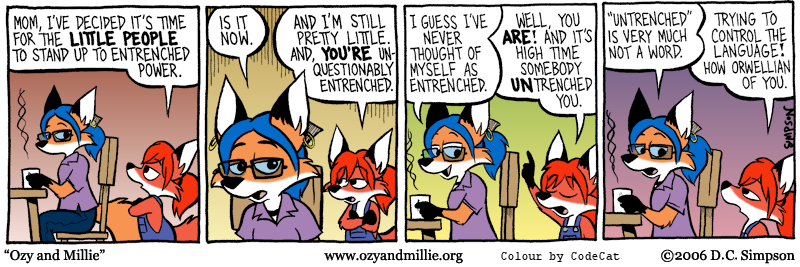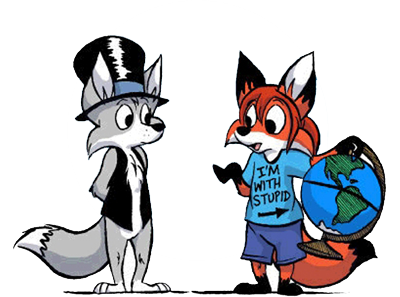
Entrenched Power 8/10/06
Moderator:Æron
- Burning Sheep Productions
- Posts:4175
- Joined:Fri Oct 31, 2003 8:56 am
- Location:Australia
- Contact:
But... According to dictionary.com, untrenched is a word.
Though, interestingly, untrench is not.
http://dictionary.reference.com/search?r=2&q=Untrenched
(also, as frequently pointed out by Countdown's resident lexicologist Susie Dent, who I believe works fulltime for the Oxford University Press on the Oxford English Dictionary, that just because a word isn't found in the dictionary doesn't make it bad english to use the word, simply that the term hasn't been used in a propper publication, and so isn't considered to be a formal part of the english language. This is especially true with un- words which meander in and out of dictionaries all the time, but are fairly universally understood weather they are in or out of the dictionary. One of the advantages of english being such a flexiable language is that there is no canonical list of words, and that anyone can use common componants to invent new words to express themselves if neccessary.
(diffability is a fairly fun one I encountered recently. Clearly derived from the term disability to describe people who, while not possessing the full set of abilities of mainstreme society, possess a different set of abilities rather than simply less abilities from the main set. Autistics, for example, would fall under said term. Bouncebackability is an unfortunate term that hit the British media recently due to a football manager using it in a press conference. While people laughed at him for using it, it's hit enough publisised sources (which include videos, I believe) with clear meaning that I do expect it to show up in the OED at some point))
To summise this multi-parragraph paranthesis, then, just because you wouldn't use a non-propper noun in scrabble doesn't make it a bad word to use in everyday life. Provided meaning is conveyed by the term, it is perfectly good english, especially since english's almost infinite maleability is it's strength.)
(not that the actual word untrenched actually is the past participle of removing trenches like it sounds like it is, but actually means 'to be without trenches', so you couldn't untrench somebody. Unentrench would be the opposite of the verb entrench (to give someone trenches/to take trenches away from someone... Well... On one of the definitions of entrench. Entrench can simply mean to occupy a trench...))
Though, interestingly, untrench is not.
http://dictionary.reference.com/search?r=2&q=Untrenched
(also, as frequently pointed out by Countdown's resident lexicologist Susie Dent, who I believe works fulltime for the Oxford University Press on the Oxford English Dictionary, that just because a word isn't found in the dictionary doesn't make it bad english to use the word, simply that the term hasn't been used in a propper publication, and so isn't considered to be a formal part of the english language. This is especially true with un- words which meander in and out of dictionaries all the time, but are fairly universally understood weather they are in or out of the dictionary. One of the advantages of english being such a flexiable language is that there is no canonical list of words, and that anyone can use common componants to invent new words to express themselves if neccessary.
(diffability is a fairly fun one I encountered recently. Clearly derived from the term disability to describe people who, while not possessing the full set of abilities of mainstreme society, possess a different set of abilities rather than simply less abilities from the main set. Autistics, for example, would fall under said term. Bouncebackability is an unfortunate term that hit the British media recently due to a football manager using it in a press conference. While people laughed at him for using it, it's hit enough publisised sources (which include videos, I believe) with clear meaning that I do expect it to show up in the OED at some point))
To summise this multi-parragraph paranthesis, then, just because you wouldn't use a non-propper noun in scrabble doesn't make it a bad word to use in everyday life. Provided meaning is conveyed by the term, it is perfectly good english, especially since english's almost infinite maleability is it's strength.)
(not that the actual word untrenched actually is the past participle of removing trenches like it sounds like it is, but actually means 'to be without trenches', so you couldn't untrench somebody. Unentrench would be the opposite of the verb entrench (to give someone trenches/to take trenches away from someone... Well... On one of the definitions of entrench. Entrench can simply mean to occupy a trench...))
Livejournal, GreatestjournalSirQuirkyK: GSNN argued that Unanonemous is to sociologists what DoND is to statisticians
Gizensha Fox: ...Porn?
- Bocaj Claw
- Posts:8523
- Joined:Mon Apr 25, 2005 11:31 am
- Location:Not Stetson University
- Contact:
- mother nature's son
- Posts:99
- Joined:Fri Aug 11, 2006 3:42 pm
- Location:upstate ny
Who is online
Users browsing this forum: No registered users and 17 guests

